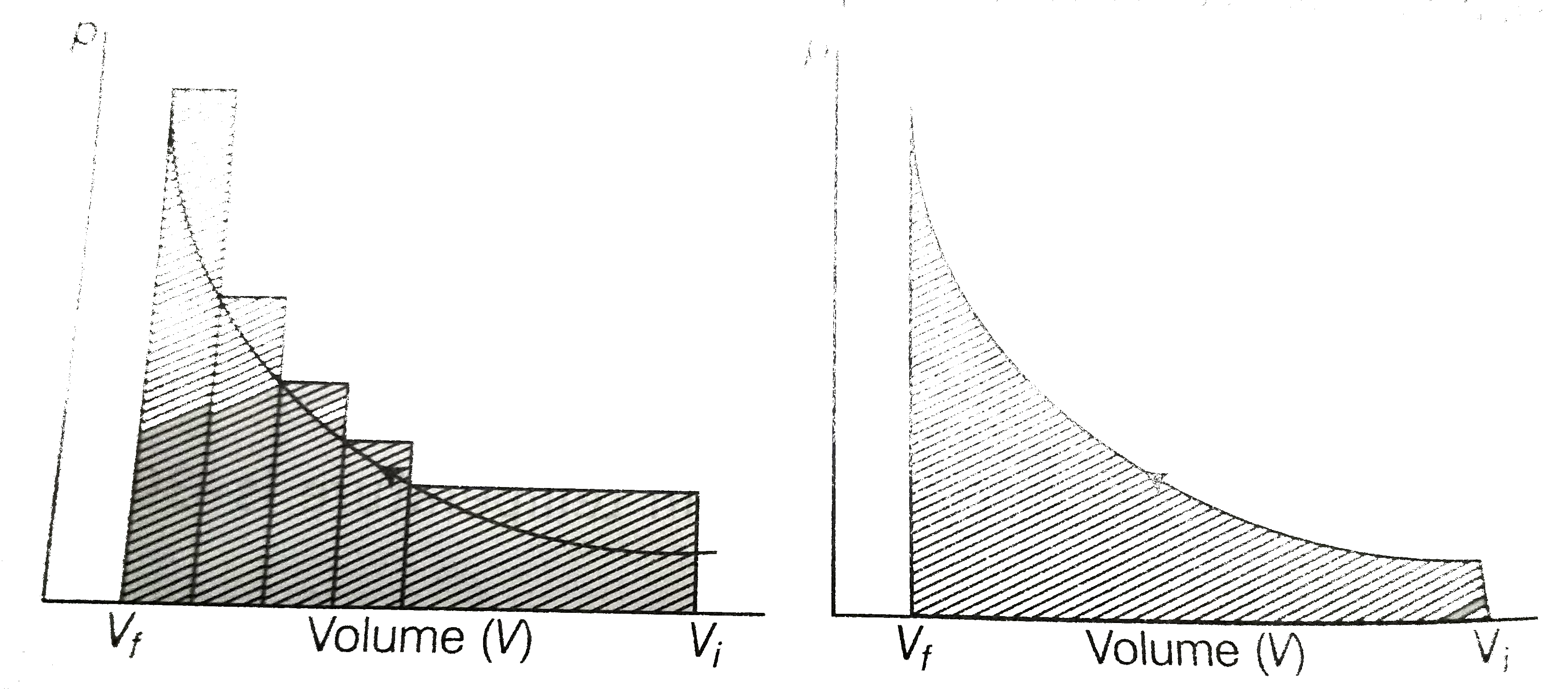The pressure volume work for an ideal gas can be calculated by using the expression w=−∫vfViPexdV. The work can also be calculated from the pV-plot by using the area under the curve within the specified limits. When an ideal gas is compressed (a) reversibly or (B) irreversibly from volume Vi to Vf choose the correct option.
W (reversible) = W (irreversible)
W (reversible) < W (irreversible)
W (reversible) = W (irreversible)
W (reversible) = W (irreversible) +pex.ΔV
The correct Answer is:B
The correct option is W (reversible) <W (irreversible). This is because area under curve is always more in irreversible compression as can be seen from given figure

Topper's Solved these Questions
Similar Questions
What is the relation for work done (i) reversibly and (ii) irreversibly for the isothermal expansion of an ideal gas from volume V1 to V2 at temperature T?
View SolutionWrite the expression to calculate maximum work done when 1 mole of an ideal gas expands isothermally and reversibly from V1 to V2
View Solution
Knowledge Check
- Question 1 - Select One
The pressure volume work for an ideal gas can be calculated by using the expression W=−∫VfVipextdV. The work can also be calculated from the pV-plot by using the area under the curve within the specified limits. When an ideal gas is compressed (a) reversibly or (b) irreversibly from volume Vi to Vf. choose the correct option.
AW(reversible)=W(irreversible)BW(reversible)<W(irreversible)CW(reversible)>W(Irreversible)DW(reversible)=W(irreversible)+pext⋅ΔV - Question 2 - Select One
The pressure-volume work for an ideal gas can be calculated by using the expression W=−∫VfViPexdV. The work can also be calculated from the pV - plot by using the area under the curve within the specified limits. When an ideal gas is compressed (i) reversibly or (ii) irreversibly from volume Vi to Vf. Choose the correct option.
AWreversible=WirreversibleBWreversible<WirreversibleCWreversible>WirreversibleDWreversible=Wirreversible+PexΔV - Question 3 - Select One
The pressure-volume work for an ideal gas can be calculated by using the expression w=−∫VfVipexdV.The work can be calculated form the pV- plot by using the area under the curve within the specified limits. When an ideal gas is compressed (a) reversibly or (b) irreversibly from volume Vi to Vf, choose the correct option.
Aw (reversible) = w (irreversible)Bw (reversible) < w (irreversible)Cw (reversible) > w (irresversible)Dw(reversible) = w(irreversible) + pexΔV
The pressure volume work for an ideal gas can be calculated by using the expression w=−∫vfViPexdV. The work can also be calculated from the pV-plot by using the area under the curve within the specified limits. When an ideal gas is compressed (a) reversibly or (B) irreversibly from volume Vi to Vf choose the correct option.
View SolutionThe pressure-volume work for an ideal gas can be calculated by using the expression ω=−∫υ1υ1PexdV. The work can also be calculated form the Pv, plot by using the area under the curve within the specified limits. When an ideal gas is compressed (a) reversiblity or (b) irrevesibly form volume VitoVf choose the correct option:
View SolutionFor the ideal gas , the work of reversible expansion under isothermal conditions can be calculated by
using the expression w=−nRTInvfvI
A sample containing 1.0 mol of an ideal gas is expanded isothermally and reversibly to ten times of its original is carried put at 300 K and at 600 K respectvely . Choose the correct option .View SolutionA gas expands under constant pressure P from volume V1 toV2The work done by the gas is
View SolutionFor an ideal gas, the work of reversible expansion under isothermal condition can be calculated by using expression =−nRTln.VfVi. A sample containing 1.0 mol of an ideal gas is expanded isothermally and reversible to ten times of its original volume, in two separate experiments. The expansion is carried out at 300 K and at 600 K respectively. Choose the correct option
View Solution

